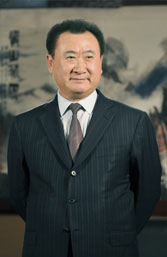Wanda to invest US$2.5b in Russian projects
- By Zhang Rui
 0 Comment(s)
0 Comment(s) Print
Print E-mail China.org.cn, June 7, 2012
E-mail China.org.cn, June 7, 2012
|
|
|
Wang Jianlin [China.org.cn / File photo] |
Wang Jianlin, Chairman of Dalian Wanda Group, Lu Zhiqiang, Chairman of China Oceanwide Holdings Group and Akhmed Bilalov, Chairman of Russia's North Caucasus Resorts, signed a letter of intent in Beijing Tuesday involving an investment of US$2.5-3 billion, the 21st Century Business Herald reported.
According to the letter of intent, the investors will build major cultural, tourist and commercial facilities in Moscow, St. Petersburg, North Caucasus and other regions in Russia.
The letter of intent has been submitted to China's National Development and Reform Commission and the Ministry of Foreign Affairs.
Commenting on the signing, Wanda's chairman Wang Jianlin said: "What we signed this time is only a letter of intent. There is a long way to go before we can turn the intent into actual investment. The investment project still contains some uncertainties."
Only last month, the Wanda Group signed a merger and acquisition agreement with AMC Entertainment, the world's second-largest theater chain, after two years of hard negotiations. The Wanda Group purchased AMC's full stake and inherited its debts, investing US$3.1 billion in the deal.
Wanda's aggressive moves were seen by observers as concrete steps in implementing its internationalization strategy.
Discussing Wanda's internationalization strategy in April, Wang explained that the group will increase its investment in cultural and tourism aspects, storing competition priority for the next decade and transforming its roles by 2020. The commercial real estate proportion of the business will amount to less than half of the company's entire property portfolio.
The Wanda Group was founded in 1988 and operates in five major industry sectors: commercial properties, luxury hotels, tourism investment, cultural industries, and department store chains. The company has assets of US$35 billion, an annual income of US$16.7 billion and pays US$2.6 billion in taxes. The Wanda Group has become one of China's leading enterprises.
The Wanda Group began to massively invest in cultural industries in 2005. It has subsequently invested more than US$1.6 billion in cultural industries and become the nation's largest enterprise investor in cultural industries.
Wang who holds a 50 percent stake in the Wanda Group, has consistently set new goals for the enterprise. "Wanda sees internationalization as a very important part of our strategy," Wang said. "We do sacrifice domestic profit up to a certain point, but we need to integrate with the world. When Wanda's profit exceeds US$50 billion or even US$100 billion, I don't want it stay a domestic company. It should be a company with a global brand."
Wang's interests are currently focused more on the cultural and tourist industries. He believes that the cultural industry is an industry "without a ceiling" and anticipates that China's cultural industry will explode within the next decade to become one of the fastest growing industries. Wanda Group's cultural arm has set a profit goal from the cultural industry of 40 billion yuan (US$6.29 billion) in the next five years. It also aims to become a world-class cultural enterprise.
As for its tourism projects, Wanda collaborated with other 5 top private enterprises, including China Oceanwide Holdings, to invest 100 billion yuan (US$15.73 billion) to create world-class deluxe resorts in several locations, including the Changbai Mountains and Yunnan's Xishuangbanna area. The Changbai Mountains resort, which received investments totaling 20 billion yuan (US$3.14 billion), will open its southern part in July this year with the ski slope set to open later in the year to accommodate seasonal tourism. The project, along with the new Russian projects, marks Wanda's first steps into tourism property investment.






